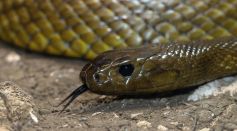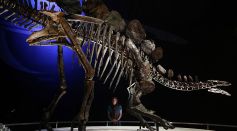ENVIRONMENT & CLIMATE

Magnitude 7 Earthquake Could Strike Central US Within 50 Years; Population Near New Madrid Fault Line Advised to Prepare ASAP

Is Dumping Old Spacecraft in Point Nemo A Good Idea? Why Are Environmentalists Against It?

5-Foot Venomous Snake Found Curled Up Inside A Cabinet Drawer After Extreme Weather Event in Australia [Look]

14.5-Foot Enormous, Mega Star Saltwater Crocodile Known as Scarface Spotted Chilling in Queensland Creek

Farmers May Soon Be Able to Talk to Pigs Using A Breakthrough AI That Interprets Their Grunts and Oinks to Improve Animal Wellbeing

Unusual Tooth Discovered in Japanese Macaques: What is Its Significance in Human Evolution?

Endangered Dolphins Spotted in New Zealand's South Island After Conservation Department Request Sighting Reports

Megalodon Sharks Grew Larger in Cooler Waters Than Those in Warmer Areas, Study Says

Crocodile Attacks 26-Year-Old Man Taking A Bath In a River In Namibia; Why This Aggressive Reptile Assaults Humans?

Red Tail Boa Shows Artistic Side In Original Painting, Snake And Other Animals' Artwork Will Be Put on Auction at Alabama Gulf Coast Zoo

‘Cute’ Prehensile-Tailed Porcupette of Smithsonian’s National Zoo Will Tug Heart Strings! [WATCH]

Possibly the Oldest Stegosaur With Tiny Head, Long Tail Spikes Discovered in China

Emerald Ash Borers Destroy Millions of US Trees; Can Biocontrol Plan Save Greens From The Exotic Beetles?
![[WATCH] Bizarre Creature Found in Sydney After Heavy a Rainfall; Biologists Try to Identify What Could This Creature Be](https://d.sciencetimes.com/en/full/38844/watch-bizarre-creature-found-sydney-after-heavy-rainfall-biologists-try-identify-what-could.jpg?w=237&h=131&f=d9450fafdf44cde6d07950dcd1a04bfd)
Bizarre Tiny Creature Found in Sydney After Heavy Rainfall Remains Unidentified [Take a Look]
Most Popular

10 Weird Things the Human Body Does—and the Science Behind These Biological Mysteries

Why Mega Typhoons Keep Getting Stronger: The Science Behind Typhoon Formation and Extreme Weather

How Plate Tectonics Trigger Earth's Most Dangerous Disasters Through Powerful Seismic Hazards

Top Space Technology Trends and Aerospace Innovations Revolutionizing the World Today





